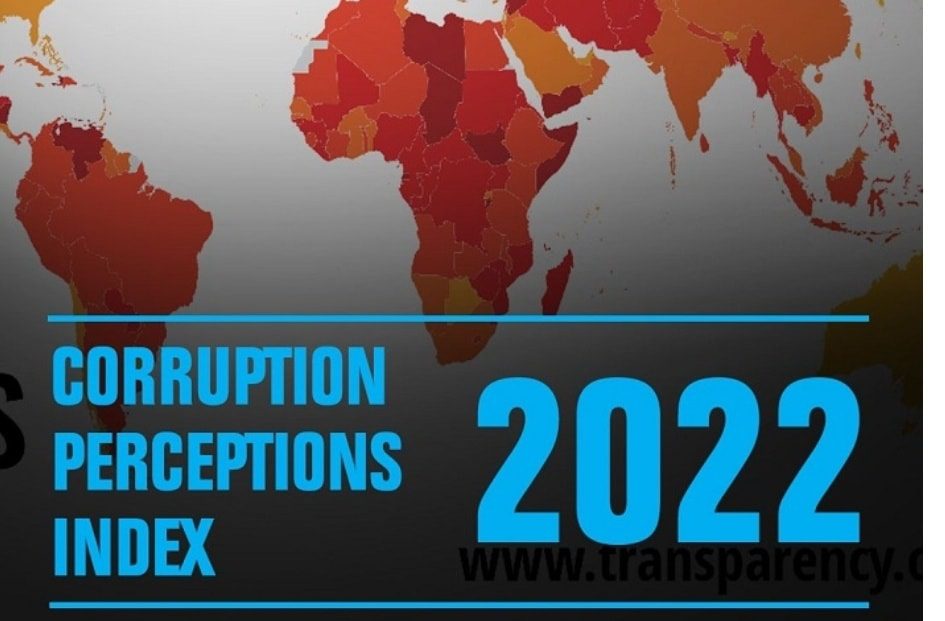Close
Close

A number of Southeast Asian nations' rankings in the 2022 Corruption Perception Index (CPI), released by Transparency International (TI) for 180 countries, have stagnated, and some other countries' democratic regress has gotten worse, which has a direct or indirect impact on the standard of public-sector governance. Indonesia's Corruption Perception Index has a 4% drop, and this situation seems to worsen.
Singapore's CPI decreased significantly from 85 in 2021 to 83 in 2022 on a scale of one to 100, where one denotes the maximum amount of corruption, whereas Malaysia's CPI decreased from 48 to 47. Vietnam increased from 39 to 42 while Thailand increased from 35 to 36. But the Philippines stayed at 33, and Indonesia's Corruption Perception Index dropped from 38 to 34. Myanmar decreased from 28 to 23, Laos increased from 30 to 31, and Cambodia rose from 23 to 24.
According to these figures, there was no clear winner among Southeast Asian nations last year. However, Vietnam deserves praise for its three-point improvement on the index. On the other hand, major losses were seen in many countries, including Myanmar and Indonesia, which is currently in charge of ASEAN.
In Myanmar, corruption has challenged the state's peace and security by undermining political, social, and economic stability. The activities of organized crime, radicalism, and terrorism have also flourished. This results from political unrest brought on by political mistrust. After its coup in 2021, the military became securely entrenched in power, leaving Myanmar unable to oversee its anti-corruption initiatives and reinvigorate its democratic pillars.
On the other hand, Indonesia, which was once seen as Southeast Asia's "big leap" in the fight against corruption and as an example of "best practices," is today going backward significantly.
Indonesia's Corruption Perception Index fell by the most in its post-reform history in 2022. Decreased constituent indices, which evaluate political corruption, conflicts of interest, the possibility for abuse of power, and bribery, such as the IMD World Competitiveness, Political Risk Service (PRS) International Country Risk Guide, and PERC Asia Risk Guide, were the cause. Given that the bulk of survey respondents was from the business community, the freefall of the 2022 CPI illustrates the business sector's concern about political will and the government's commitment to advance democratic foundations and anti-corruption measures.
International organizations like the World Bank and USAID have frequently emphasized to Indonesia the importance of strengthening its trade liberalization, deregulation, and bureaucratic reform policies. Many regulations will likely involve people close to the president and his inner circle in conflicts of interest. They have the political ability to coordinate several political forces and logistical resources to assemble the necessary elements for the existence of "populist authoritarianism."
Two glaring examples are the adoption of the contentious Job Creation Statute and the revision to the Corruption Eradication Commission (KPK) law. New investment has been negatively impacted by the uncertainty surrounding the constitutional legality of the jobs law, which also contains contentious sections on labor, the environment, and trade. By prolonging the terms of regional authorities and even village chiefs, corrupt forces have attempted to perpetuate the status quo. This is a serious problem because TI has classified Indonesian politics as a "Hybrid Regime," with a CPI average of 36.
As the ASEAN chair in 2023, Indonesia must take significant steps to strengthen regional governance in Southeast Asia and deepen strategic collaboration through an ASEAN Economic Community (AEC) to benefit the 650 million people living there. Suppose the members work together to build their economic capabilities in a way that also maximizes openness and accountability. As a result, the ASEAN region's single competitive market can only effectively fulfill its commitments to citizen welfare and regional prosperity.
Without increased openness and accountability, ASEAN will probably only help a few already-established commercial actors expand their economic operations in the area. As a result, there is a significant chance that economic power will become further concentrated in the hands of some people, with the potential to entrench rather than eradicate high-level corruption. There are more capital flows, trade, and economic transactions in the region and more opportunities for corrupt behavior.
This possibility arises from the methods used by corrupt, predatory forces in the region to launder criminal monies, conceal assets that have been stolen, and engage in other illegal economic and political activities from their home nations. Under Indonesia's chairmanship, ASEAN must address these risks immediately.
Denmark, with a CPI of 90, is placed top globally, ahead of Finland and New Zealand (both at 87), Norway (84), Singapore and Sweden (both at 83), and Switzerland (82). The nations with the lowest scores were Somalia (12), Syria and South Sudan (13), and Venezuela (14).
Bosnia & Herzegovina, the Gambia, Malawi, Nepal, and Sierra Leone share same Indonesia's Corruption Perception Index. Indonesia scored even worse than Kazakhstan (36), Lesotho (37), Colombia (39), and Sri Lanka (36). (36).
Suyatmiko stated that according to studies, economic indicators faced significant difficulties due to state policies that loosened the ease of investment and the expertise of businesses in implementing the anti-corruption system.
"What types of nations do develop nations prefer as potential investors?" Is it from nations that prioritize economic growth or strict anti-corruption laws?" He inquired. Suyatmiko noticed no major change in political indices because political corruption is still rife.
"Between politicians, public officials, and business figures, various forms of corruption, bribery, gratuities, and conflicts of interest are still frequent. Business actors who travel to Indonesia face risks including political risk in addition to financial danger, "He declared.
Law enforcement indicators also demonstrate that anti-corruption policies have failed to prevent and eliminate corruption successfully.
In conclusion, corruption is still a major issue in India. A comprehensive strategy that addresses these root causes strengthens governance and public institutions and fosters a culture of accountability and openness would be needed to combat corruption in India. By addressing these underlying reasons, India can only progress toward decreasing corruption and creating a more open, responsible, and just society.
Read More: